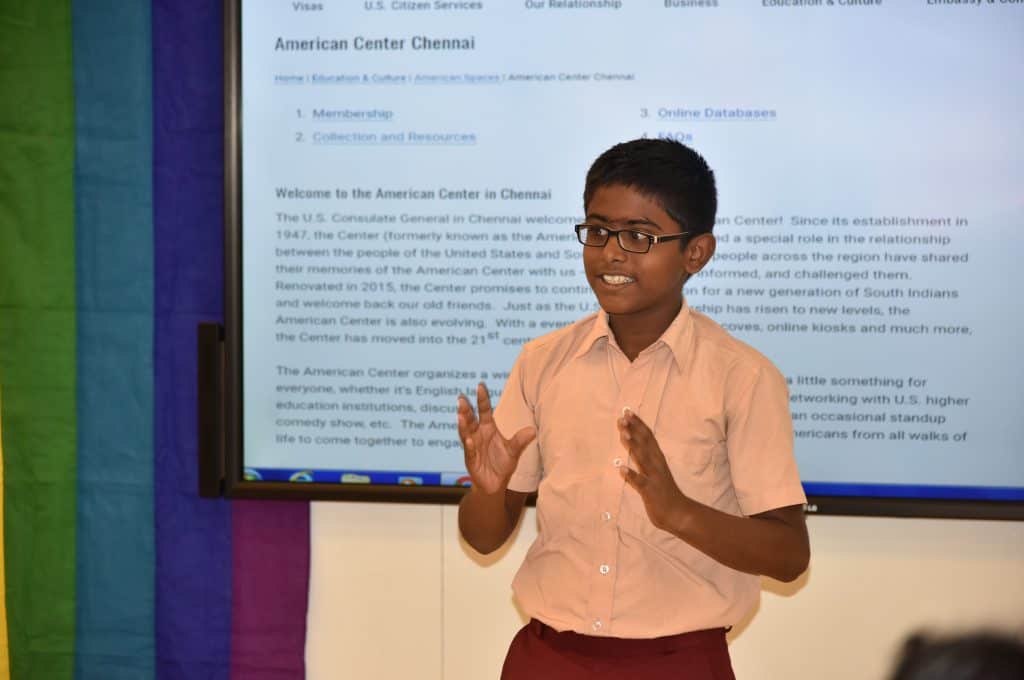It has been close to a month since R Gopinath, a Class 8 student from the Corporation Higher Secondary School in Koyambedu returned from Washington D.C. but his face brightens up still as he speaks of his experience.
Gopinath was one of the students selected by the Rotary Club, with which the US Consulate had tied up for this initiative, a branch of their two-year English Access Microscholarship programme. Eight students from Chennai’s Corporation schools were chosen for a trip to Washington D.C., based on an evaluation of their creativity and logical reasoning skills.
Before taking the trip, the students spoke to the 30 children from government schools in Chennai, who were a part of the broader Access Microscholarship programme.
“No one in my family had had a chance to complete school. When my family shared the news of my selection, everyone in my locality celebrated. It was something I had never dreamt of,” Gopinath told the other students. Gopinath’s words were an inspiration for the government school children who were initially hesitant to remain in the programme.
Remembering his trip, Gopinath says he was awestruck by the architectural beauty of the skyscrapers. They visited plenty of museums, met the city’s mayor and even a renowned astronaut from National Aeronautics and Space Administration (NASA). The eight-member team met astronaut David C Hilmer during their visit, who told them about his experience in space. During his stay in the US, Gopinath learnt about the importance of discipline and cleanliness, and he now stands in the queues in railway counters and never throws waste on the road.

R Gopinath talks to the kids selected in the Access Microscholarship Programme at US Consulate. Credits: US Consulate
A glimpse of the other world for poor students
It is not just Gopinath and his seven companions on that trip who have had life-changing experiences.
From a shy, intimidated boy to one who exudes self esteem, 19-year-old Athiphan Anbumani’s transformation has been noteworthy, even if he has not travelled abroad. English as a language no longer gives him the jitters; he is able to converse fluently and give presentations in college confidently.
A student of Loyola College, Anbumani is an alumnus of the English Access Microscholarship programme, initiated by the US Consulate with an aim to uplift students from economically backward communities. Don’t be misled by the name; the programme is not all about learning English. Besides focusing on communication skills, participants attend classes in personality development. “My poor communication skills were the reason why I couldn’t participate in many competitions in school. Thanks to the programme, I have come a long way. I overcame stage fright after having to make many presentations during the stint,” shares Anbumani.
The English Access Microscholarship programme provides a foundation to 13-20 year-olds from economically disadvantaged sectors through after-school classes and intensive sessions. Participants are trained and get a chance to compete for and participate in future exchanges and study in the United States, as mentioned in the website. Students are also given a glimpse of US culture, which broadens their knowledge and perspective.
The US Consulate has tied up with not-for-profit organisations that work to provide better learning opportunities for young children. Tests are conducted to analyse their skills of observation and reasoning, after which they are selected for the two-year access program. “Completion certificates issued to the students throw up a lot of opportunities in teaching, counselling and social service,” says Anbumani.
“The idea is to facilitate socio-cultural learning for the disadvantaged communities and help build people-to-people connection. The programme has a wide reach throughout the world,” says Lauren Lovelace, acting US Consul General in Chennai. The consulate has set up after school classes in schools and colleges in many cities including Mumbai, Delhi and Chennai. Certified teachers are employed to train the students.
“I was under the impression that the United States is self-centred and shows no responsibility towards the poor. I was proved wrong, as our batch, under the supervision of the consulate members, had trained conservancy workers and students from poor backgrounds in Chennai during the programme. Through this experience, I came to understand that US culture actually places a lot of emphasis on giving back to society,” says Anbumani.